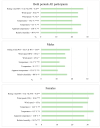Relationship between Depressive Symptoms and Weather Conditions
- PMID: 35564464
- PMCID: PMC9101342
- DOI: 10.3390/ijerph19095069
Relationship between Depressive Symptoms and Weather Conditions
Abstract
Background: Weather is a well-known factor worldwide in psychiatric problems such as depression, with the elderly and females being particularly susceptible. The aim of this study was to detect associations between the risk of depressive symptoms (DS) and weather variables. Methods: 6937 participants were assessed in the baseline survey of the Health Alcohol Psychosocial Factors in Eastern Europe (HAPIEE) study during 2006−2008. To assess the risk of DS, a multivariate logistic model was created with predictors such as socio-demographic factors, health behaviors, and weather variables. Results: DS were found in 23.4% of the respondents, in 15.6% of males and in 29.9% in females. A higher risk of DS (by 25%) was associated with November−December, a rising wind speed, and relative humidity (RH) < 94% and snowfall during the cold period occurring 2 days before the survey. A higher air temperature (>14.2 °C) predominant during May−September had a protective impact. A higher risk of DS in males was associated with lower atmospheric pressure (<1009 hPa) 2 days before. Females were more sensitive to the monthly variation, snowfall, and RH. Conclusions: The findings of our study suggest that some levels of weather variables have a statistically significant effect on DS.
Keywords: air temperature; atmospheric pressure; depressive symptoms; relative humidity; weather conditions; wind speed.
Conflict of interest statement
The authors declare that they have no competing interests.
Figures


References
-
- Hu J., Hou Z., Xu Y., Zhou M., Zhou C., Xiao Y., Yu M., Huang B., Xu X., Lin L., et al. Life loss of cardiovascular diseases per death attributable to ambient temperature: A national time series analysis based on 364 locations in China. Sci. Total Environ. 2021;756:142614. doi: 10.1016/j.scitotenv.2020.142614. - DOI - PubMed
Publication types
MeSH terms
Grants and funding
LinkOut - more resources
Full Text Sources
Medical

